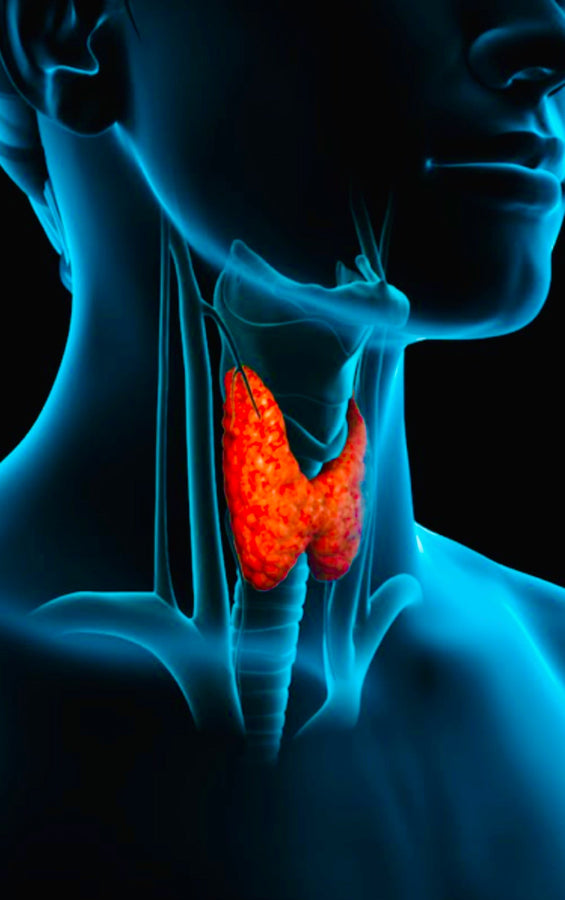Thyroid Function and EVOO - Blog #12

Happy Friday Everyone! Hope you are all staying well and drinking your EVOO! Today I want to talk about the Thyroid, its function and how EVOO can help.
Several years ago, during the course of evaluating many patients a day, I began noticIng a significant increase in the number of women taking thyroid hormone replacement therapies, such as Levothyroxine. I found this astounding and wondered just what was going on. Was it due to some environmental insult or a genetic predisposition? Was it related to diet, viral infection, or something else entirely? Not only did I see an increase in women taking Levothyroxine, but my mother had to take it and I was soon about to. I’ll tell you more about this later. Let’s look at the thyroid gland and what it does.
The thyroid is an endocrine gland, shaped like a butterfly in the front of the throat just below the Adam’s apple. It is responsible for secreting 3 hormones: T3 (triiodothyronine), T4 (thyroxine, considered a prohormone) and calcitonin. Calcitonin reduces blood calcium levels, opposing the effects of parathyroid hormone (PTH). About 94% of the hormone production in the thyroid is T4, where only about 6% is T3. T4 is converted to T3, which is the active form that drives the metabolism of pretty much all tissues in the body. The thyroid is the metabolic hub of the body. The hormones produced are responsible for your metabolic rate and protein synthesis.
If your thyroid produces too much of these hormones hyperthyroidism can develop. Symptoms can include “irritability, muscle weakness, sleeping problems, a fast heartbeat, heat intolerance, diarrhea, enlargement of the thyroid, hand tremor, and weight loss.” hyperthyroidism is the cause of Graves’ disease (autoimmune). Hypothyroidism is when these hormones are not produced in the quantities needed for body function. This can occur in iodine-deficient regions. This is the reason many countries began ionizing table salt. Symptoms include feeling cold, tiredness, constipation, dry skin, feeling ‘fuzzy headed’, slow heart rate, weight gain, irregular menstrual periods, puffiness around the eyes and depression. It can lead to developmental delays in growth and intellect in babies of untreated mothers. Goiters, thyroid cancer and nodules can also occur. The autoimmune disease linked to hypothyroidism is Hashimoto’s thyroiditis (autoimmune), which occurs in iodine-rich regions. Many are forced to supplement thyroid hormones, such as Levothyroxine. Thyroiditis (inflammation of the thyroid) is another disorder that causes hypothyroidism, but when cell damage is acute, hormones can leak out into the bloodstream causing thyrotoxicosis and symptoms similar to hyperthyroidism (even though the thyroid is under active.
Okay, so what’s going on here? Subclinical hypothyroidism is the term used for most of us who feel our metabolism is slow or our thyroid is just not functioning quite right. We may have some of the symptoms listed above, but not all of them. When we get our bloodwork done, we may notice our TSH (thyroid stimulating hormone) levels are high, while our thyroxine levels are normal. In the U.S. up to 8.5% of people are experiencing this. What does this mean? TSH is produced by the pituitary gland in the brain in response to low T4 and T3 levels. A study involving 107 patients (93 women, 14 men) with subclinical hypothyroidism were followed over 6-72 months, 26.8% developed overt hypothyroidism. They determined that TSH concentration appears to be the most powerful predictor of outcome in patients over 55 years of age. So, if your body thinks you don’t have enough T4 and T3, your hypothalamus sends a chemical message, thyrotropin releasing hormone (TRH), to your pituitary gland (beneath it). It produces TSH to stimulate the thyroid to make more of these hormones. TSH triggers the production of thyroglobulin (protein) that joins 4 molecules of iodine, which is the T4 hormone.
Now, T4 must be converted to T3 to function. This process mostly happens in...you guessed it...the liver!!!! It also happens in cells of the heart, gut, muscle and nerves. Basically, the conversion involves removal of one iodine molecule to form the T3 functioning hormone. When all is said and done only about 60% of T4 is actually converted to active T3. Approximately 20% becomes reverse T3 (rT3), which is nonactive, and the body cannot use. So, liver and gut function are crucial in thyroid function and metabolism in the body. Could many of these subclinical hypothyroid individuals have a fatty liver or poor gut health that is causing these symptoms?
When the liver is not functioning correctly, it cannot break down hormones for elimination, thus reducing the free T3s! Estrogen is another hormone the liver must deal with. If your estrogen levels are too high, thyroid binding proteins are elevated preventing thyroid hormones from getting into cells. Estrogen is stored in body fat, so it is important when losing weight to be aware of this. Your body has to clear that extra estrogen, which is also happening in the liver and eventually the gut. “The intestines convert about 20% of T4 to T3, but only in the presence of enough healthy gut bacteria.” So, something as simple as taking an antibiotic can drastically affect your thyroid function. Normally, we have about 4 billion healthy bacteria in our large intestines. If these are killed off and out of balance, gastric inflammation occurs. There’s that word again, INFLAMMATION!! This triggers a whole sequence of an alarm reaction in the body with the adrenals producing more cortisol, Which in turn can further decrease active T3 and increasing inactive rT3. So, liver and gut health are dramatically connected to the thyroid health. It’s easy to see how this can become a viscous cycle, leading to all kinds of problems and symptoms that are hard to identify.
It seems to me that the best plan of action is to enhance liver and gut function, decrease inflammation, replenish bacterial flora, eat appropriate levels of foods containing iodine (must be careful trying to supplement this), controlling levels of estrogens (plant estrogens like soy) and decrease stress (cortisol). Enter EVOO...What did we say Oleic Acid does for our liver? Decreases inflammation, combats fatty liver (through modulation of LXR - see Blog 2), protects from insulin resistance, beneficial effects on cholesterol, signals the opening of bile ducts to remove excess hormones and other metabolite waste products, enables production of many hormones and enhances conversion of T4 to T3. What does Oleic acid do for the gut? It improves total bacterial density as well as the proportions or balance of gut microbiota, enhances weight loss, protects lining of intestines and enhances elimination. What about Oleocanthal? The powerful antioxidant action reduces inflammation, combats oxidation and kills cancer cells (liver and other organs) and has neuroprotective activities and enhances Oleic acid’s effects as well. As we know, many adverse effects of poor liver and gut health lead to higher risk of many diseases such as IBS, type 2 diabetes, inflammatory bowel disease, metabolic syndrome, obesity, allergies, colorectal cancer and Alzheimer’s disease that we have already talked about (gut-brain axis).
Okay, so as I told you guys in the beginning, I was experiencing low thyroid issues as well and began taking Levothyroxine for subclinical hypothyroidism. However, this changed when my doctor went on a mission trip to South America for 3 months and I could not get my prescription refilled. What to do? I began researching what on earth would help my thyroid work better. Pesticides in food as well as plastics leaching into food were 2 of the biggest endocrine annihilators! I went organic, started a pre/probiotic and stopped buying bottled water. Guess what? My free T4 and T3 went up into the normal ranges, but were still on the low end, but TSH was still high. That was 7 years ago. As you all know by now, I started drinking high polyphenol EVOO in January, had my bloodwork done in February and my thyroid hormones are in the mid-normal range. I was so happy that I don’t actually have a thyroid problem!!! I now know it was probably a combination of fatty liver and poor microbiota health that was causing this. I DO recommend talking to your doctor, monitoring your thyroid hormone levels and addressing fatty liver and gut health related to your thyroid function. Knowing all the wonderful effects of EVOO on the body, it only makes sense to get it in your body in raw form!!!
So, dear friends and fellow health enthusiasts, until next time...drink, drizzle, digest your EVOO, get a good pre and probiotic, eat fatty fish, drink lots of water and get plenty of sleep, exercise your body and mind!!! #EVOO
This blog is intended for informational purposes only. Discuss strategies with your Healthcare Practitioner.







Comments (2)
Well, I found this article very interesting. I was looking for such information as given herein but could never get a fair appraisal of Hypothyroidism and it’s many concerns. But that said, I found this information given here to be very informative and since I’m on 0.075 thyroid Levothyroxine, I’m interested in trying to find a way to get my thyroid back on track naturally.. Meantime, I’m 88 and maybe it’s just old age that has me the way I am. But… we will see. Again.. great article…. certainly enjoyed reading it and it gave me faith that maybe I can do something with my thyroid as I want to go on living a normal life and not have to take prescription pills and such. Again.. thanks for the article.
Hi John!
Thank you so much for your comment! I do have a couple recommendations for you if you are wanting to get off the levothyroxin. First, you need to see if you have thyroid antibodies – that is your immune system saw an undigested protein that leaked from your gut and looks like the thyroid – then begins attacking the thyroid. Being 88, this is likely and unfortunately you would need to stay on the thyroid hormone replacement therapy. However, if it is not due to that, try going organic, avoid plastics and omit grains and soy from your diet for about 3 months – then retest your thyroid levels and see if you can come off the meds. Don’t forget to take your HP-EVOO as well!
Also, I am Health-coaching and currently taking clients! Feel free to reach out to me anytime.
Health and happiness to you
Julie